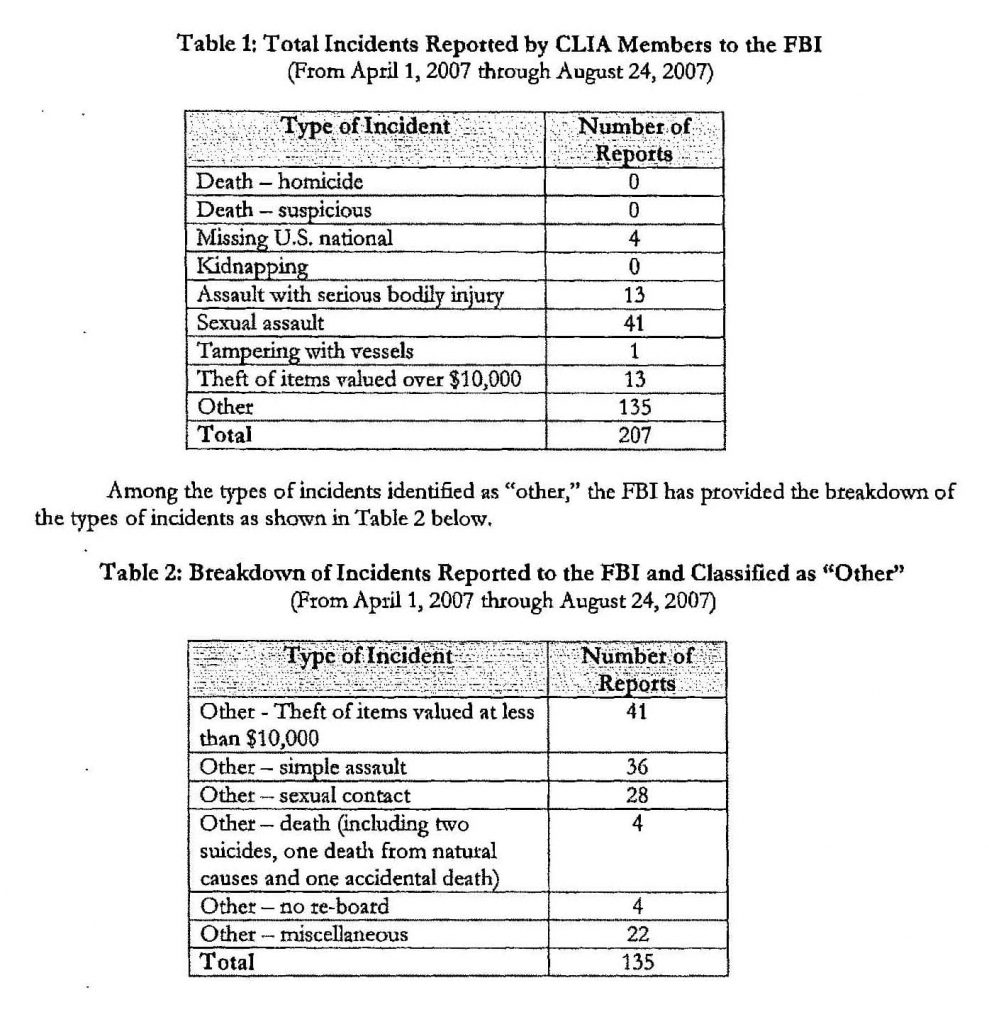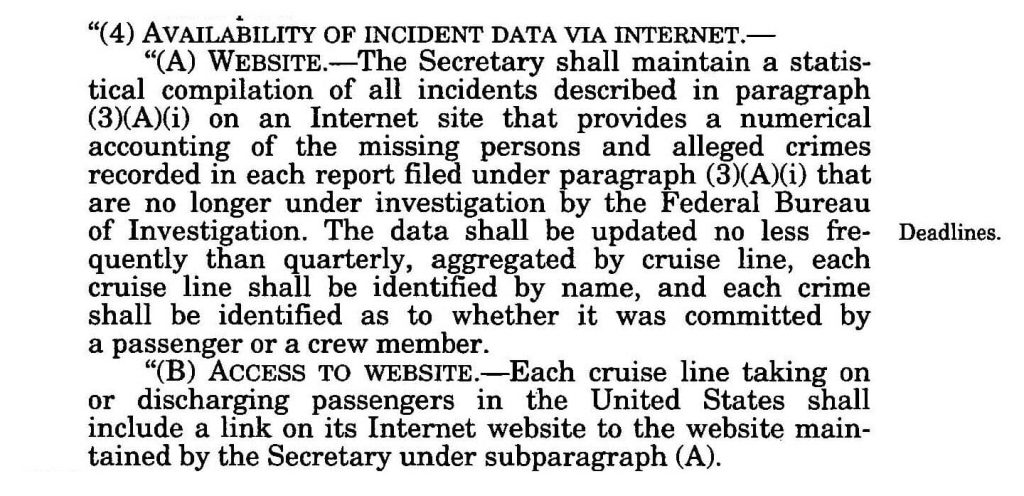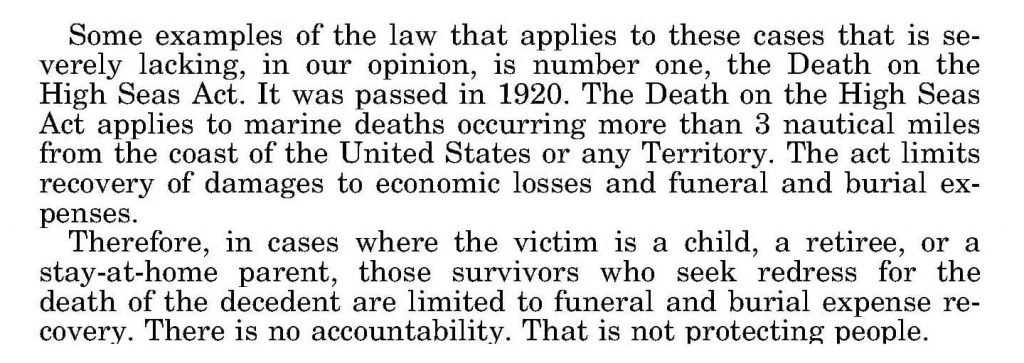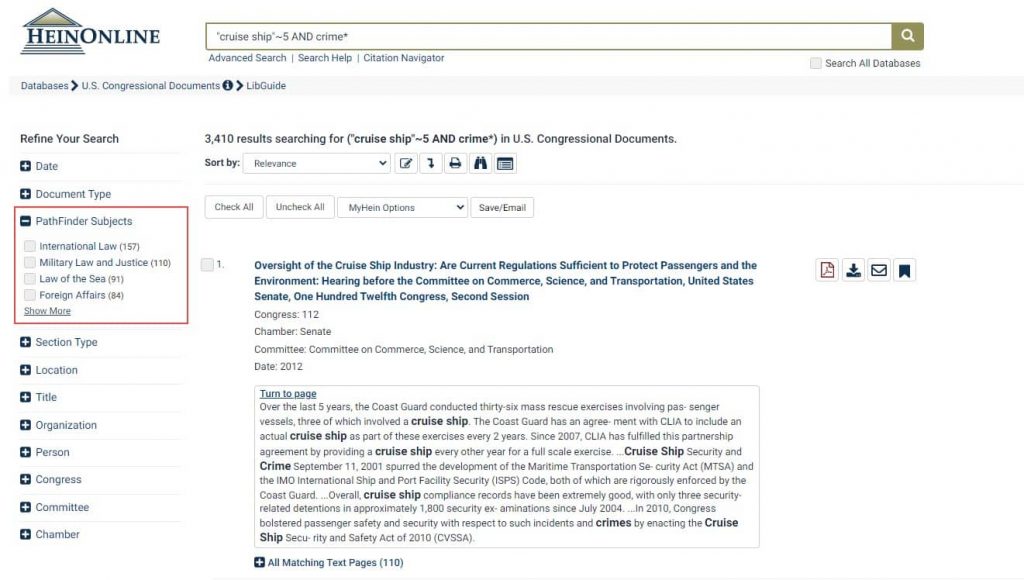Did you take a vacation for spring break? Perhaps you and your family booked a cruise and sailed to warmer waters, sandy beaches, and exciting shore excursions. Hopefully on that cruise, you enjoyed a great buffet, amazing live entertainment, and swam in a pool with a giant curling water slide. Hopefully nothing happened on your vacation that forced you to swim in the murky legal waters that govern cruising when the vacation goes awry. When an assault, robbery, or even a murder happens aboard a cruise ship, different jurisdictions apply than those passengers may be familiar with while on land. Using HeinOnline, let’s explore some of the legal issues surrounding cruise ship crime.
Cruising into Trouble
According to a 2016 report from the Florida-Caribbean Cruise Association, approximately 52% of cruise passengers are from the United States.[1]Eda Harotounian, Cruise Ship and Crime: How to Better Protect United States’ Citizens Who Are Victims of Crime on the High Seas, 54 LOY. L. A. L. REV. 959 (2021). This article is found in HeinOnline’s Law Journal … Continue reading But while American passengers may board their cruise ship at an American port, be it Miami, New York, San Diego, Boston, Seattle, or New Orleans, the ship itself is more than likely registered (or “flagged” in maritime terms) with a country other than the United States. Ships are subject to the laws of the country they are flagged under, and that country is responsible for regulating the ship.[2]Eda Harotounian, Cruise Ship and Crime: How to Better Protect United States’ Citizens Who Are Victims of Crime on the High Seas, 54 LOY. L. A. L. REV. 959 (2021). This article is found in HeinOnline’s Law Journal … Continue reading Because ship owners can choose their state of registry, they are often inclined to choose countries that offer lower taxes and less stringent safety regulations and labor laws. The practice of choosing to fly the flag of a more business-friendly country is known as “flying a flag of convenience.” Panama and the Bahamas are particularly popular countries for cruise ships to register in; aside from three ships operating in Hawaii, all of the 200 or so ocean-going cruise ships worldwide are flagged in countries other than the United States.[3]Crimes against Americans on Cruise Ships: Hearing before the Subcommittee on Coast Guard and Maritime Transportation of the Committee on Transportation and Infrastructure, House of Representatives, 110th Cong. (2007). This hearing is found in … Continue reading While ships who dock at U.S. ports are subject to certain regulations by the U.S. Coast Guard, these only concern vessel safety and navigation.[4]Leticia M. Diaz & Barry Hart Dubner, An Examination of the Evolution of Crime at Sea and the Emergence of the Many legal Regimes in Their Wake, 34 N.C.J. INT’l L. & COM. REG. 521 (2009). … Continue reading
Amy Lynn Bradley
In March 1998, 23-year-old Amy Lynn Bradley took a Royal Caribbean cruise with her parents and brother, Brad. Their destination was the island of Curaçao in the Dutch Antilles, and they were sailing aboard the Rhapsody of the Seas. The ship sailed out from San Juan on March 21, 1998 to Aruba, its first port of call. On March 23, the Rhapsody of the Seas left Aruba and headed through international waters towards Curaçao. That night, Amy and Brad attended a Mardi Gras party at the ship’s onboard nightclub, where they danced and drank with members of the ship’s band. At the end of the evening’s revelries, the siblings returned to the family’s cabin around 3:30 in the morning and sat together on the suite’s balcony until Brad retired to bed. Sometime around 5:30 am, their father, Ron, awoke and saw Brad asleep in his bed and Amy sleeping on the balcony. Assured his children were safe, Ron went back to sleep. But when he woke again about 30 minutes later, Amy was gone. She was never seen again.
The Bradleys disembarked in St. Thomas and contacted the FBI about their daughter’s disappearance. But the FBI’s investigatory powers were limited in Amy’s case, as they often are when it comes to many cruise ship incidents. The Rhapsody was not registered in the United States, and Amy had disappeared in international waters. Cruise ships staff security personnel, not police officers, and the preservation of evidence and a crime scene is completely dependent on the abilities of cruise employees[5]Crimes against Americans on Cruise Ships: Hearing before the Subcommittee on Coast Guard and Maritime Transportation of the Committee on Transportation and Infrastructure, House of Representatives, 110th Cong. (2007). This hearing is found in … Continue reading until the FBI or other law enforcement arrives. Depending on where the ship is currently located, the FBI needs to clear various jurisdictional hurdles to even board the ship. Investigation and prosecution of a crime requires the cooperation of foreign authorities, with the laws of other nations[6]Crimes against Americans on Cruise Ships: Hearing before the Subcommittee on Coast Guard and Maritime Transportation of the Committee on Transportation and Infrastructure, House of Representatives, 110th Cong. (2007). This hearing is found in … Continue reading determining the extent of legal authority the FBI will have. Even though the Bradleys disembarked the ship to contact authorities, the Rhapsody continued on its scheduled cruise without making passengers aware of what had happened. Amy’s case remains open with the FBI today.
George Smith IV
On July 5, 2005, newlyweds Jennifer and George Smith IV were on a picturesque Mediterranean honeymoon cruise with Royal Caribbean, when George mysteriously disappeared in Greek waters. Cruise officials at the time thought George had accidentally fallen overboard, but reports from fellow passengers of an altercation between George and an unknown group of men and the discovery of blood staining the side of the ship hinted at a more nefarious fate. George’s disappearance prompted a pair of Congressional hearings[7]International maritime security, parts I and II: joint hearing before the Subcommittee on National Security, Emerging Threats, and International Relations and the Subcommittee on Criminal Justice, Drug Policy, and Human Resources of the Committee on … Continue reading on international maritime security. Despite the fierce attention on his case, George Smith IV has never been found and the FBI officially closed its investigation into his disappearance in 2015.
Regulatory Tides Sweep In
Cruise ships are subject to several overlapping laws. All international commercial and passenger shipping is monitored and regulated by the United Nations’ International Maritime Organization to “provide machinery for cooperation among Governments.” Legislation adopted by the IMO must be implemented by member governments,[8]Sarah J. Tomlinson, Smooth Sailing – Navigating the Sea of Law Applicable to the Cruise Line Industry, 14 VILL. Sports & ENT. L.J. 127 (2007). This article is found in HeinOnline’s Law Journal Library. but the IMO itself does not have the authority to enforce its own guidelines. The United Nations Convention on the Law of the Sea,[9]1833 U.N.T.S 31363. This treaty is found in HeinOnline’s United Nations Law Collection. which was adopted in 1982, establishes rules governing maritime activities, including setting definitions for sea areas, such as territorial waters and contiguous zones. Areas outside these definable limits are known as “the high seas,” or waters outside any country’s jurisdiction. It is important to note that the United States is not a party to the United Nations Convention on the Law of the Sea.
Titles 18 and 33[10]Complete archives and current editions of the U.S. Code can be found in HeinOnline’s dedicated United States Code collection of the U.S. Code outline the abilities and limitations of the United States to intervene in crimes committed against its people on cruise ships. At the time of George and Amy’s disappearances, cruise lines were not legally required to report to the U.S. government any crimes that occurred onboard unless the crime happened within the 12-mile territorial waters of the United States,[11]Crimes against Americans on Cruise Ships: Hearing before the Subcommittee on Coast Guard and Maritime Transportation of the Committee on Transportation and Infrastructure, House of Representatives, 110th Cong. (2007). This hearing is found in … Continue reading even if U.S. nationals were involved. The United States could assert criminal jurisdiction under the Special Maritime and Territorial Jurisdiction[12]Cruise Ship Security Practices and Procedures: Hearing before the Subcommittee on Coast Guard and Maritime Transportation of the Committee on Transportation and Infrastructure, House of Representatives, 110th Cong. (2007). This hearing is found in … Continue reading if the crime occurred outside the jurisdiction of any nation (the high seas) and 1) the crime was committed by or against a U.S. national; 2) the ship is owned in whole or in part by U.S. entities and is in the admiralty and maritime jurisdiction of the United States; 3) the crime occurred in U.S. territorial waters; or 4) the ship departed from or is arriving in a U.S. port.
Prompted by Congressional attention into George Smith’s case, in 2007 a voluntary agreement[13]Cruise Ship Security Practices and Procedures: Hearing before the Subcommittee on Coast Guard and Maritime Transportation of the Committee on Transportation and Infrastructure, House of Representatives, 110th Cong. (2007). This hearing is found in … Continue reading was reached between the FBI, Coast Guard, and the Cruise Line International Association (CLIA) to streamline reporting of crimes that fall under the Special Maritime and Territorial Jurisdiction, such as homicide, missing persons, sexual assault, kidnapping, and theft above $10,000. Reporting of incidents outside these parameters is up to the discretion of the cruise lines, and the agreement only applies to cruise lines that are members of CLIA. In the first four months of the agreement’s implementation, 207 incidents were reported to the FBI.

In 2010, Congress passed the Cruise Vessel Security and Safety Act[14]124 Stat. 2243 (2010). This law can be found in HeinOnline’s U.S. Statutes at Large collection. (CVSSA), which sought to improve passenger safety. It mandated new safety features on ships, such as security latchets and time-stamped key technology for passenger rooms, ship rail height, and surveillance and detection technologies for passengers who fall overboard. It also mandated providing each passenger with a security guide[15]124 Stat. 2243 (2010). This law can be found in HeinOnline’s U.S. Statutes at Large collection. that enumerated the various jurisdictional limitations in place should they be the victim of a crime. Importantly, the CVSSA improved upon the evidence collecting and reporting requirements previously set out in the United States Maritime Transportation Security Act of 2002[16]116 Stat. 2064 (2002). This law can be found in HeinOnline’s U.S. Statutes at Large collection. by establishing minimum training standards for cruise ship security personnel in the science of crime scene preservation,[17]124 Stat. 2243 (2010). This law can be found in HeinOnline’s U.S. Statutes at Large collection. including having rape kits and antiviral medication onboard for sexual assault cases.[18]124 Stat. 2243 (2010). This law can be found in HeinOnline’s U.S. Statutes at Large collection. One of the final changes mandated by the CVSSA was that cruise lines must make available on their websites all statistics on “missing persons and alleged crimes” not under investigation by the FBI; importantly, the act exempts cruise lines from publishing data on active investigations.

Those wishing to see an archive of these reports can do so on the Department of Transportation’s website, with the most recent report covering January—March 2021; unsurprisingly, given the immense disruption to cruising due to the COVID-19 pandemic, only one incident, a sexual assault, appears on the latest report.
Smooth(er) Sailing, but Rough Waters Remain
While the CVSSA made attempts to increase transparency around cruise line safety, victims argue more can be done. Sexual assault is the most reported crime committed aboard cruise ships, but those numbers are likely underreported given the CVSSA only collects data on crimes that meet the FBI’s threshold for investigation; any incident reported, but not investigated by the FBI, is omitted from these counts. It is estimated that of all alleged crimes committed on cruise ships, the FBI will only open investigations into 10-20% of them.[19]Tiffany L. Peyroux, The Cruise Vessel Security and Safety Act of 2010 Founders on Its Maiden Voyage, 13 LOY. MAR. L.J. 74 (2014). This article is found in HeinOnline’s Law Journal Library.
The Cruise Passenger Protection Act (CPAA),[20]Cruise Passenger Protection Act (S. 1340): Improving Consumer Protections for Cruise Passengers: Hearing before the Committee on Commerce, Science, and Transportation, United States Senate, 110th Cong. (2014). This hearing is found in … Continue reading first introduced in 2013, attempted to address some of the shortcomings of the CVSSA. The CPPA would strengthen requirements for general medical care and training requirements for cruise personnel, create a 24-hour telephone line for victims, and mandate the reporting of all alleged incidents, whether investigated by the FBI or not. The CPAA would also seek to make cruise lines liable for wrongful deaths of passengers and require greater transparency in the language of cruise contracts. Prompted by the sinking of the Titanic in 1912, Congress enacted the Death on the High Seas Act,[21]41 Stat. 537 (1920). This law can be found in HeinOnline’s U.S. Statutes at Large collection. which awarded a decedent’s family damages if “the death of an individual is caused by wrongful act, neglect, or fault occurring on the high seas beyond a marine league from the shore of the States or the District of Columbia, or the Territories or dependencies of the United States.” Courtroom wrangling over the meaning of “the high seas,” including from the Supreme Court,[22]524 U.S. 116 (1998). This case is found in HeinOnline’s U.S. Supreme Court Library. helps shield cruise lines from being liable for nonpecuniary (losses that cannot be mathematically quantified) losses.

The CPAA has been reintroduced in Congress several times, most recently in the 116th Congress,[23]Commercial and Passenger Vessel Safety: Challenges and Opportunities: Hearing before the Subcommittee on Coast Guard and Maritime Transportation of the Committee on Transportation and Infrastructure, House of Representatives, 116th Cong. (2019). … Continue reading but has not yet been passed into law.
Sea of Knowledge
Did you know that HeinOnline has a dedicated subcollection on the law of the sea? Within our History of International Law collection, users will find our Law of the Sea subcollection, containing hundreds of titles relating to the policing of international waters, maritime law, and an assortment of issues relating to the oceans, such as salvage, commercial shipping, and maritime disasters.

One of our favorite ways to research is to find Congressional hearings on a topic. The debates of Congress shed light on how lawmakers react to issues, the issues they find worthy of federal attention, and their proposed solutions, often contrasted with the legislation, if any, that is actually passed.
HeinOnline contains thousands of Congressional hearings. Users looking for a place to start can navigate into the Congressional Hearings subcollection in the U.S. Congressional Documents collection. From there, use the one-box search feature to perform a proximity search that looks for the words cruise and ship occurring within five words of each other, along with the word crime.
PathFinder subjects will appear as one of the options to help filter down our search results. Relevant subjects users may want to choose from include Law of the Sea, International Law, and Maritime Law.

Be sure to throw your research a lifebuoy by subscribing to the HeinOnline Blog to receive all our latest research tips, tricks, content news, and more posts just like this one.
HeinOnline Sources[+]
| ↑1, ↑2 | Eda Harotounian, Cruise Ship and Crime: How to Better Protect United States’ Citizens Who Are Victims of Crime on the High Seas, 54 LOY. L. A. L. REV. 959 (2021). This article is found in HeinOnline’s Law Journal Library. |
|---|---|
| ↑3, ↑5, ↑6, ↑11 | Crimes against Americans on Cruise Ships: Hearing before the Subcommittee on Coast Guard and Maritime Transportation of the Committee on Transportation and Infrastructure, House of Representatives, 110th Cong. (2007). This hearing is found in HeinOnline’s U.S. Congressional Documents collection. |
| ↑4 | Leticia M. Diaz & Barry Hart Dubner, An Examination of the Evolution of Crime at Sea and the Emergence of the Many legal Regimes in Their Wake, 34 N.C.J. INT’l L. & COM. REG. 521 (2009). This article is found in HeinOnline’s Law Journal Library. |
| ↑7 | International maritime security, parts I and II: joint hearing before the Subcommittee on National Security, Emerging Threats, and International Relations and the Subcommittee on Criminal Justice, Drug Policy, and Human Resources of the Committee on Government Reform, House of Representatives, 110th Cong. (2005). This hearing is found in HeinOnline’s U.S. Congressional Documents collection. |
| ↑8 | Sarah J. Tomlinson, Smooth Sailing – Navigating the Sea of Law Applicable to the Cruise Line Industry, 14 VILL. Sports & ENT. L.J. 127 (2007). This article is found in HeinOnline’s Law Journal Library. |
| ↑9 | 1833 U.N.T.S 31363. This treaty is found in HeinOnline’s United Nations Law Collection. |
| ↑10 | Complete archives and current editions of the U.S. Code can be found in HeinOnline’s dedicated United States Code collection |
| ↑12, ↑13 | Cruise Ship Security Practices and Procedures: Hearing before the Subcommittee on Coast Guard and Maritime Transportation of the Committee on Transportation and Infrastructure, House of Representatives, 110th Cong. (2007). This hearing is found in HeinOnline’s U.S. Congressional Documents collection. |
| ↑14, ↑15, ↑17, ↑18 | 124 Stat. 2243 (2010). This law can be found in HeinOnline’s U.S. Statutes at Large collection. |
| ↑16 | 116 Stat. 2064 (2002). This law can be found in HeinOnline’s U.S. Statutes at Large collection. |
| ↑19 | Tiffany L. Peyroux, The Cruise Vessel Security and Safety Act of 2010 Founders on Its Maiden Voyage, 13 LOY. MAR. L.J. 74 (2014). This article is found in HeinOnline’s Law Journal Library. |
| ↑20 | Cruise Passenger Protection Act (S. 1340): Improving Consumer Protections for Cruise Passengers: Hearing before the Committee on Commerce, Science, and Transportation, United States Senate, 110th Cong. (2014). This hearing is found in HeinOnline’s U.S. Congressional Documents collection. |
| ↑21 | 41 Stat. 537 (1920). This law can be found in HeinOnline’s U.S. Statutes at Large collection. |
| ↑22 | 524 U.S. 116 (1998). This case is found in HeinOnline’s U.S. Supreme Court Library. |
| ↑23 | Commercial and Passenger Vessel Safety: Challenges and Opportunities: Hearing before the Subcommittee on Coast Guard and Maritime Transportation of the Committee on Transportation and Infrastructure, House of Representatives, 116th Cong. (2019). This hearing is found in HeinOnline’s U.S. Congressional Documents collection. |



